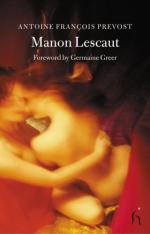“He informed me that Manon, totally unable to endure the dread of want, and, above all, the certainty of being at once obliged to dispense with her equipage, had begged of him to make her acquainted with M. G—— M——, who had a character for liberality. He carefully avoided telling me that this was the result of his own advice, and that he had prepared the way before he introduced his sister. `I took her there this morning,’ said he, `and the fellow was so enchanted with her looks that he at once invited her to accompany him to his country seat, where he is gone to pass some days. As I plainly perceived,’ said Lescaut, `the advantage it may be to you, I took care to let him know that she had lately experienced very considerable losses; and I so piqued his generosity that he began by giving her four hundred crowns. I told him that was well enough for a commencement, but that my sister would have, for the future, many demands for money; that she had the charge of a young brother, who had been thrown upon her hands since the death of our parents; and that, if he wished to prove himself worthy of her affections, he would not allow her to suffer uneasiness upon account of this child, whom she regarded as part of herself. This speech produced its effect, he at once promised to take a house for you and Manon, for you must know that you are the poor little orphan. He undertook to set you up in furniture, and to give you four hundred livres a month, which if I calculate rightly, will amount to four thousand eight hundred per annum. He left orders with his steward to look out for a house, and to have it in readiness by the time he returned. You will soon, therefore, again see Manon, who begged of me to give you a thousand tender messages, and to assure you that she loves you more dearly than ever.’
V
Infected with that leprosy of lust,
Which taints the hoariest years of vicious men
Making them ransack to the very last
The dregs of pleasure for their vanished joys.
Byron.
“On sitting down to reflect upon this strange turn of fate, I found myself so perplexed, and consequently so incapable of arriving at any rational conclusion, that I allowed Lescaut to put repeated questions to me without in the slightest degree attending to their purport. It was then that honour and virtue made me feel the most poignant remorse, and that I recalled with bitterness Amiens, my father’s house, St. Sulpice, and every spot where I had ever lived in happy innocence. By what a terrific interval was I now separated from that blessed state! I beheld it no longer but as a dim shadow in the distance, still attracting my regrets and desires, but without the power of rousing me to exertion. `By what fatality,’ said I, `have I become thus degraded? Love is not a guilty passion! why then has it been to me the source of profligacy and distress? Who prevented me from leading a virtuous and tranquil




